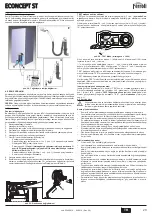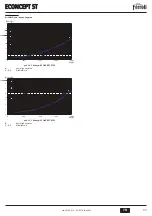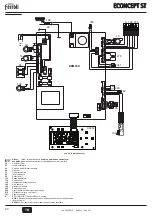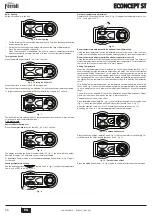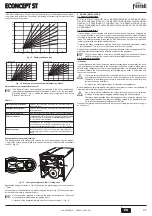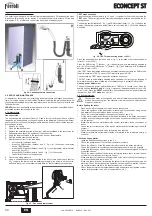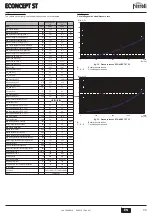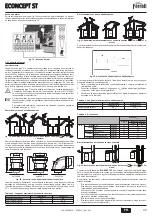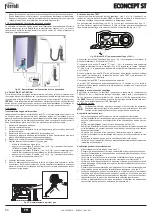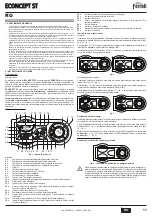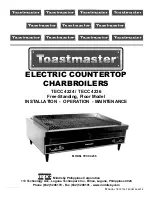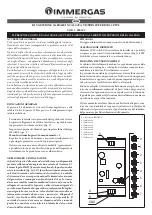
ECONCEPT ST
40
EN
cod. 3540S814 -
/201
(Rev. 00)
3.7 Condensate drain connection
The boiler is equipped with an internal trap to drain condensate. Fit the inspection union
A
and hose
B
, pressing it in for approx. 3 cm and securing it with a clamp. Fill the trap
with approx. 0.5 l. of water and connect the hose to the drainage system.
fig. 24 - Condensate drain connection
4. SERVICE AND MAINTENANCE
All adjustment, conversion, commissioning and maintenance operations described be-
low must only be carried out by Qualified Personnel (meeting the professional technical
requirements prescribed by current regulations) such as those of the Local After-Sales
Technical Service.
FERROLI
declines any liability for damage and/or injury caused by unqualified and un-
authorised persons tampering with the unit.
4.1 Adjustments
Gas conversion
The unit can operate on Natural Gas or LPG and is factory-set for use with one of these
two gases, as clearly shown on the packing and on the dataplate. Whenever a different
gas to that for which the unit is arranged has to be used, a conversion kit will be required,
proceeding as follows:
1.
Remove the casing.
2.
Open the sealed chamber.
3.
Replace the nozzle
A
inserted in the mixer, with that contained in the conversion kit.
4.
Reassemble and check the tightness of the connection.
5.
Apply the label, contained in the conversion kit, near the dataplate.
6.
Refit the sealed chamber and casing.
7.
Modify the parameter for the type of gas:
•
put the boiler in standby mode
•
press the DHW buttons (details 1 and 2 - fig. 1) for 10 seconds. the display
shows "
P01
" flashing.
•
press the DHW buttons (details 1 and 2 - fig. 1) to set parameter
00
(for natural
gas) or
01
(for LPG).
•
press the DHW buttons (details 1 and 2 - fig. 1) for 10 seconds.
•
the boiler will return to standby mode
8.
Check the working pressure.
9.
Using a combustion analyser connected to the boiler fume outlet, check that the
CO
2
content in the fumes, with the boiler operating at max. and min. output, corre-
sponds to that given in the technical data table for the corresponding type of gas.
fig. 25 - Gas nozzle replacement
TEST mode activation
Press the heating buttons (details fig. 13 and 4 - ) together for 5 seconds to activate the
TEST
mode. The boiler lights at the maximum heating power set as described in the fol-
lowing section.
The heating symbol (detail 24 - fig. 1) and DHW symbol (detail 12 - fig. 1) flash on the
display; the heating power and actual flame current value (uA x 10) will be displayed
alongside.
fig. 26 - TEST mode (heating power = 100%)
Press the heating buttons (details 3 and 4 - fig. 1) to increase or decrease the power
(min.=0%, max.=100%).
Press the DHW button
"-"
(detail 1 - fig. 1) and boiler power is immediately adjusted to
min. (0%). Press the DHW button
"+"
(detail 2 - fig. 1) and boiler power is immediately
adjusted to max. (100%).
If the TEST mode is activated and enough hot water is drawn to activate the DHW mode,
the boiler remains in TEST mode but the 3-way valve goes to DHW.
To deactivate the TEST mode, repeat the activation sequence.
The TEST mode is automatically disabled in any case after 15 minutes or on stopping of
hot water drawing (in case of drawing of hot water enough to activate DHW mode).
Heating power adjustment
To adjust the heating power, switch the boiler to TESTsec. 4.1 mode (see ). Press the
heating buttons
(details 3 and 4 -
) to fig. 1increase or decrease the power (min. = 00
- max. = 100). Press the
RESET
button within 5 seconds and the max. power will remain
that just set. Exit TEST
mode (
see sec. 4.1).
4.2 System start-up
B
Checks to be made at first ignition, and after all maintenance operations that
involved disconnecting from the systems or an intervention on safety devices
or parts of the boiler:
Before lighting the boiler
•
Open any on-off valves between the boiler and the systems.
•
Check the tightness of the gas system, proceeding with caution and using a soap
and water solution to detect any leaks in connections.
•
Check the correct preloading of the expansion tank (ref. sec. 5.3)
•
Fill the water system and make sure that all air contained in the boiler and the sys-
tem has been vented by opening the air vent valve on the boiler and any vent valves
on the system.
•
Make sure there are no water leaks in the system, hot water circuits, connections or
boiler.
•
Check the correct connection of the electric system and the functioning of the earth
system. l
•
Check that the gas pressure value for heating is as required.
•
Make sure there are no flammable liquids or materials in the immediate vicinity of
the boiler
Checks during operation
•
Ignite the appliance as described in sec. 2.3.
•
Check the airtightness of the fuel circuit and water systems.
•
Check the efficiency of the flue and air-fume ducts while the boiler is working.
•
Check that the water is circulating properly between the boiler and the systems.
•
Make sure that the gas valve modulates correctly in both the heating and hot water
production phases.
•
Check the proper ignition of the boiler by performing various tests, turning it on and
off with the room thermostat or remote control.
•
Make sure that the fuel consumption indicated on the meter corresponds to that giv-
en in the technical data table in sec. 5.3.
•
Make sure that with no call for heating the burner correctly ignites on opening a hot
water tap. Check that during heating operation, on opening a hot water tap, the heat-
ing circulator stops and there is a regular production of hot water.
•
Check the parameters are programmed correctly and perform any required custom-
ization (compensation curve, power, temperatures, etc.)
A
eco
comfort
m
o
d
e
r e s et
eco
bar




